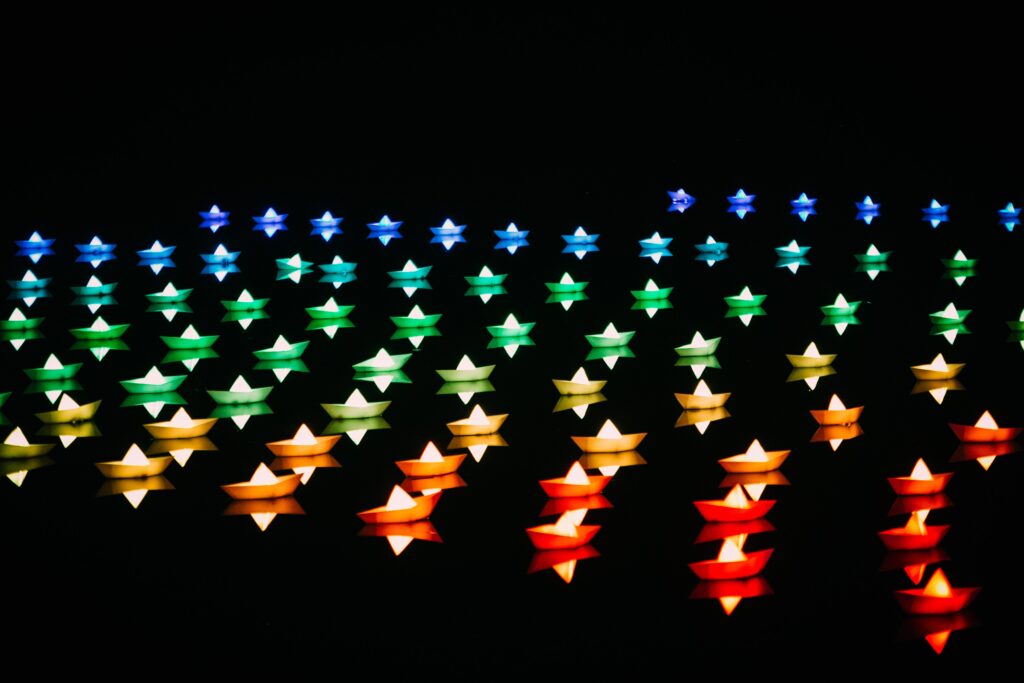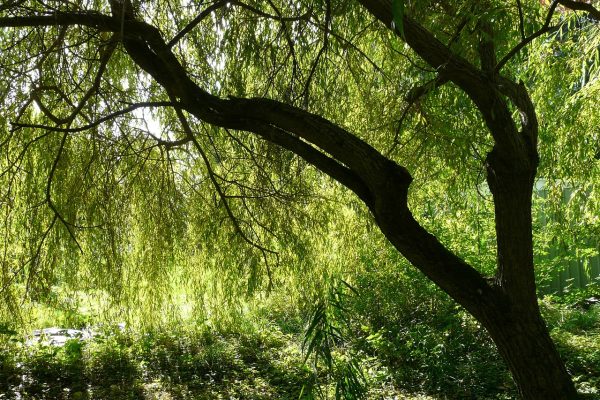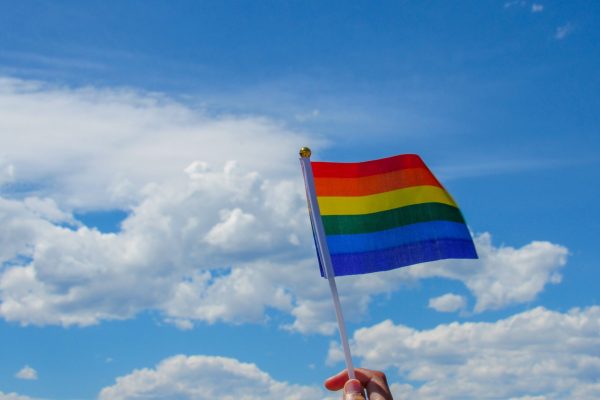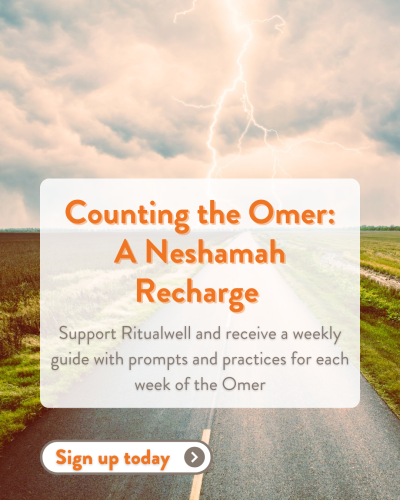Our tradition holds many rituals around mourning, healing, and honoring, and we have compiled suggestions which may be utilized to remember transgender people who were killed because of structural oppression and sinat chinam, baseless hatred. Please feel welcome to use this as a guide and create your own services with friends and community in the time leading up to November 20th.
Space * מקום * Makom
Set aside an intentional space in your home or place of prayer to be available for you while marking this day.
-
Cover your makom with a meaningful cloth
-
Light a yahrzeit (memorial) candle the eve before November 20th, or the morning of.
-
Fill up a cup of מים חיים, living water to represent resilience and life
Add pictures, poems, stories, readings, and artwork to include on your makom and within your memorial.
The Martyred * זכרונם לברכה * May Their Memories Be Blessed
In Jewish tradition, when a person is murdered, an entire world is completely destroyed. The International Trans Day of Remembrance website memorializes victims of transphobic violence, sharing names and how their individual lives were shattered. You may choose to read aloud or contemplate the stories which recount the murder of trans* people. In our daily prayer space, we have pasted the names and stories of people killed in the year 2014, and have a highlighter marker and yahrzeit candle nearby. Community members have the opportunity to approach the wall, read names and stories, and highlight the name of a trans*person to carry with them in their prayers throughout the week. Some students have chosen to recite the mourner’s kaddish in their honor.
May there soon be a day when we are able to learn about and honor the lives and stories of transgender human beings as they Live—we will not only hear about transgender people in their deaths.
Afterwards, you may wish to read aloud the Jewish memorial for Trans Day of Remembrance written by Rabbi Reuben Zellman, or A Jewish Guide to Marking TDoR.
You may also wish to learn more about our Jewish trans* ancestors who created paths for us, and stories of our herstory and continuity.
-
Two of our trans* ancestors, Claude Cahun and The Maiden of Ludmir, are honored in TimTum- A Yiddishe Trans Zine, by Micah Bazant
-
We are also thankful to have many elders and teachers in our midst, including trans activist Leslie Feinberg z’l who passed away on November 15, 2014. Resources which discuss our persistence and presence in Jewish tradition include:
Talmudic non-binary genders (!)
G!d Filled With Compassion * א-ל מלא רחמים * El Maley Rakhamim
This prayer is traditionally recited at funerals, on the yahrzeit (anniversary of an individual’s death) and during the yizkor service (memorial services associated with holidays throughout the year). We chant this prayer in remembrance of our dead to recall their living and dying, and to bring their souls closer to us in Olam HaZeh, the physical world of the living. (With thanks to many brilliant people who joined in to transform El Maley Rakhamim).
|
El Maley Rakhamim shocheyn ba’meromim, hamtzey m’nukha n’khuna takhat kanfey haShekhina, b’ma’alot k’doshim u’tehorim k’zohar ha’rakiya me’irim u’mazhirim, et nishmot hakhayil, haTransgenderiyot v’haAndrogenusim, banot adam she’avru beyn g’derot ha’migdar b’khol makom b’olam asher nishberu u’n’hargu v’nirtzakhu v’nidkhafu l’hitabdut, b’shel sinat khinam b’libam shel hatzarim. B’gan eden t’hi menukhatam, ana mekor ha’rakhamim yastiran b’seyter k’nafav l’olamim, v’yitzror bitzror hakhayim et nishmoteyhen, Adon’ay hu nakhalatan, v’yanukhu bashalom al mishkavoteyhen, v’nomar: ameyn
|
אֵל מָלֵא רַחֲמִים שׁוֹכֵן בַּמְּרוֹמִים הַמְצֵא מְנוּחָה נְכוְּנָהּ תַּחַת כַּנְפֵי הַשְּׁכִינָה בְּמַעֲלוֹת קְדוֹשִׁים וּטְהוֹרִים כְּזֹהַר הָרָקִיעַ מְאִירִים וּמַזְהִירִים אֶת נִשְׁמוֹת הֵחִיל הַחַיִל הָטְרָנְסְגֵינְדֵרִיוֹת וְהָאַנדְרוֹגֵינוּסִים בָּנוֹת אָדָם שֶׁעָבְרוּ בֵּין גְּדֵרוֹת הֲמִגְדַּר בְּכָל מָקוֹם בְּעוֹלָם אֲשֶׁר נִשְׁבְּרוּ וּנְהָרְגוּ וְנִרְצַחוּ וְנִדְחֲפוּ לְהִתְאַבְּדוּת בְּשֶׁל שִׂנְאַת חִנָּם בְּלִבָּם שֶׁל הַצָּרִים בְּגַן עֵדֶן תְּהִי מְנוּחָתָם אָנָּא מְקוֹר הָרַחֲמִים יַסְתִּירָן בְּסֵתֶר כְּנָפָיו לְעוֹלָמִים וְיִצְרֹר בִּצְרוֹר הַחַיִּים אֶת נִשְׁמֹתֵיהֶן ה’ הוּא נַחֲלָתָן וְיָנוּחוּ בַּשָּׁלוֹם עַל מִשְׁכָּבוֹתֵיהֵן וְנֹאמַר אַמֵּן |
G!d, full of compassion who dwells in the heights, find a fitting rest under the wings of the Shekhina, within the ascent of the holy and the pure, whose splendor shines and radiates as the firmament. May all of the fierce souls of the trans*gender people, human beings who transcended between the borders of gender in all the places of the world where they were shattered, murdered, destroyed, and pushed to suicide because a deep seeded hatred was in the hearts of their oppressors. The garden of Eden will be a resting place to them, Please! Source of Compassion, safeguard them forever beneath the safety of Your sheltering wings, and bind their souls with the chords of life. G!d is their heritage, they shall rest peacefully in their places, and let us say: Ameyn
Please, With Power * אנא בכח * Ana Bekoach
This is a mystical prayer written by Nechunia ben Hakanah calling for protection and redemption. Ana Bekoach is traditionally chanted to indicate time movement, transition, and transformation, and is said as the week shifts into Shabbat, at divorce rituals, with people struggling through illness to initiate healing, every evening as we mark the counting of the omer, and some even chant it daily to cleanse before entering an important part of the daily prayer service. The first letter of each word helps to form the secret forty-two letter Name of G!d- which is unpronounceable, yet contained within these words. Each line of the prayer corresponds to one of The Creator’s sefirot (divine attributes). No traditional names for G!d appear in Ana Bekoach because this prayer addresses The Creator’s Oneness at a level that is beyond the names we normally use to call out to G!d. We ask that G!d unties us from atrocity: to protect, redeem, nourish our souls, and empower those of us who are seekers of wholeness, unity, and collective healing. Please find nigunim (melodies) to carry this prayer with you at neohasid.org.
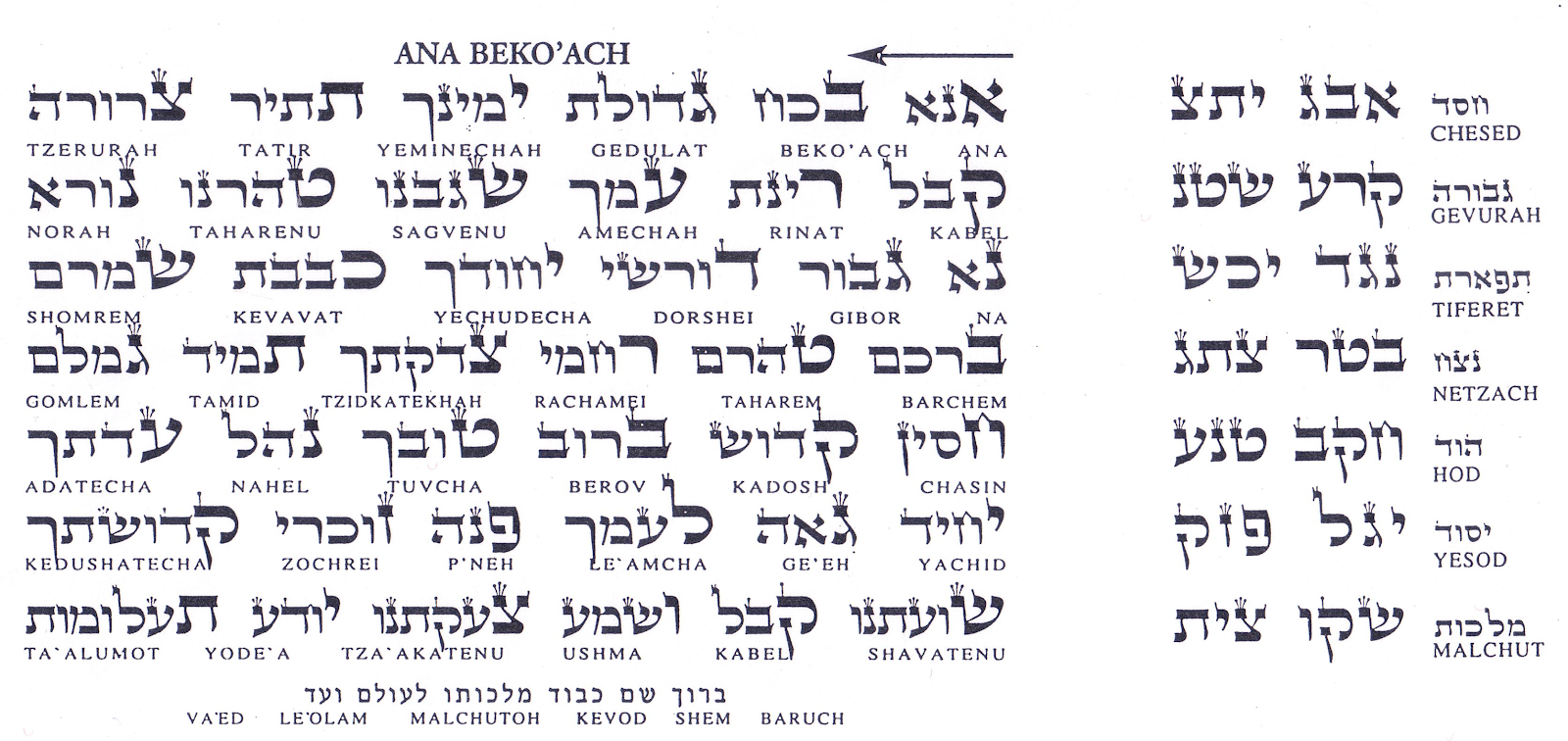
Please, with power, the magnanimity of your right hand, untie the bundled atrocities
receive the cry of your people, empower us, purify us, Awesome One
please, Great One, the seekers of your unity, guard them like the apple of your eye
bless them, purify them, let the mercies of your justice always be their recompense
powerful Holy One, with your lofty abundance, guide your congregation
Unique One, Exalted, face your people, rememberers of your holiness
our cries receive and hear our screams, knower of secrets.
Blessed is the name of the glory of G!d’s kingdom forever and again.
Psalm 35 * תהילים לה
A Psalm of Uprising
We call upon God to do our battles for us in hearts and minds and on streets, to be a protector and defender. We yearn for an end to transphobia, which seeks to harm our trans* family and existence. This is a psalm of courage, which affirms continuity and envisions the overthrowing of oppression.
|
א לְדָוִד | רִיבָה יְהֹוָה אֶת־יְרִיבַי לְחַם אֶת־לֹֽחֲמָֽי ב הַֽחֲזֵק מָגֵן וְצִנָּה וְקוּמָה בְּעֶזְרָתִֽי ג וְהָרֵק חֲנִית וּסְגֹר לִקְרַאת רֹדְפָי אֱמֹר לְנַפְשִׁי יְֽשֻֽׁעָתֵךְ אָֽנִי ד יֵבשׁוּ וְיִכָּלְמוּ מְבַקְשֵׁי נַפְשִׁי יִסֹּגוּ אָחוֹר וְיַחְפְּרוּ חשְׁבֵי רָעָתִֽי ה יִֽהְיוּ כְּמֹץ לִפְנֵי־רוּחַ וּמַלְאַךְ יְהֹוָה דּוֹחֶֽה ו יְֽהִי־דַרְכָּם חשֶׁךְ וַֽחֲלַקְלַקֹּת וּמַלְאַךְ יְהֹוָה רֹדְפָֽם ז כִּֽי־חִנָּם טָֽמְנוּ־לִי שַׁחַת רִשְׁתָּם חִנָּם חָפְרוּ לְנַפְשִֽׁי ח תְּבוֹאֵהוּ שׁוֹאָה לֹא יֵדָע וְרִשְׁתּוֹ אֲשֶׁר־טָמַן תִּלְכְּדוֹ בְּשׁוֹאָה יִפָּל־בָּֽהּ ט וְנַפְשִׁי תָּגִיל בַּיהֹוָה תָּשִׂישׂ בִּישׁוּעָתֽוֹ י כָּל עַצְמֹתַי | תֹּאמַרְנָה יְהֹוָה מִי כָמוֹךָ מַצִּיל עָנִי מֵחָזָק מִמֶּנּוּ וְעָנִי וְאֶבְיוֹן מִגֹּזְלֽוֹ יא יְקוּמוּן עֵדֵי חָמָס אֲשֶׁר לֹא־יָדַעְתִּי יִשְׁאָלֽוּנִי יב יְשַׁלְּמוּנִי רָעָה תַּחַת טוֹבָה שְׁכוֹל לְנַפְשִֽׁי יג וַֽאֲנִי | בַּֽחֲלוֹתָם לְבוּשִׁי שָׂק עִנֵּיתִי בַצּוֹם נַפְשִׁי וּתְפִלָּתִי עַל־חֵיקִי תָשֽׁוּב יד כְּרֵעַ כְּאָֽח־לִי הִתְהַלָּכְתִּי כַּֽאֲבֶל־אֵם קֹדֵר שַׁחֽוֹתִי טו וּבְצַלְעִי שָׂמְחוּ וְֽנֶאֱסָפוּ נֶאֶסְפוּ עָלַי נֵכִים וְלֹא יָדַעְתִּי קָֽרְעוּ וְלֹא־דָֽמּוּ טז בְּחַנְפֵי לַֽעֲגֵי מָעוֹג חָרֹק עָלַי שִׁנֵּֽימוֹ יז אֲדֹנָי כַּמָּה תִּרְאֶה הָשִׁיבָה נַפְשִׁי מִשֹּׁאֵיהֶם מִכְּפִירִים יְחִידָתִֽי יח אוֹדְךָ בְּקָהָל רָב בְּעַם עָצוּם אֲהַֽלְלֶֽךָּ יט אַל־יִשְׂמְחוּ־לִי אֹיְבַי שֶׁקֶר שׂנְאַי חִנָּם יִקְרְצוּ־עָֽיִן כ כִּי לֹא שָׁלוֹם יְדַבֵּרוּ וְעַל רִגְעֵי־אֶרֶץ דִּבְרֵי מִרְמוֹת יַֽחֲשֹׁבֽוּן כא וַיַּרְחִיבוּ עָלַי פִּיהֶם אָמְרוּ הֶאָח הֶאָח רָֽאֲתָה עֵינֵֽינוּ : כב רָאִיתָה יְהֹוָה אַל־תֶּחֱרַשׁ אֲדֹנָי אֲל־תִּרְחַק מִמֶּֽנִּי : כג הָעִירָה וְהָקִיצָה לְמִשְׁפָּטִי אֱלֹהַי וַֽאדֹנָי לְרִיבִֽי : כד שָׁפְטֵנִי כְצִדְקְךָ יְהֹוָה אֱלֹהָי וְאַל־יִשְׂמְחוּ־לִֽי : כה אַל־יֹאמְרוּ בְלִבָּם הֶאָח נַפְשֵׁנוּ אַל־יֹאמְרוּ בִּֽלַּֽעֲנֽוּהוּ : כו יֵבשׁוּ וְיַחְפְּרוּ | יַחְדָּו שְׂמֵחֵי רָעָתִי יִלְבְּשׁוּ־בשֶׁת וּכְלִמָּה הַמַּגְדִּילִים עָלָֽי : כז יָרֹנּוּ וְיִשְׂמְחוּ חֲפֵצֵי צִדְקִי וְיֹאמְרוּ תָמִיד יִגְדַּל יְהֹוָה הֶחָפֵץ שְׁלוֹם עַבְדּֽוֹ: כח וּלְשׁוֹנִי תֶּהְגֶּה צִדְקֶךָ כָּל־הַיּוֹם תְּהִלָּתֶֽךָ |
The Mourner’s Kaddish * קדיש יתום * Kaddish Yatom
Traditionally, we say Kaddish with a community of 10 people to sanctify and elevate the souls of lost loved ones. Kaddish does not mention death or mourning. It teaches that when we turn our consciousness to holiness, the legacy of our loved ones may continue, their memories soaring in our hearts.
|
Yitgadal v’yitkadash sh’mey raba b’alma di v’ra khir’utey; v’yamlikh malkhutey b’hayeykhon u-v’yomeykhon, uv’khayey d’khol beyt yisrael, ba-agala u-vi-z’man kariv, v’imru amen. Y’hey sh’mey raba m’varakh l’alam u-l’almey almaya. Yitbarakh v’yishtabakh, v’yitpa’ar v’yitromam, v’yitnasey v’yit-hadar, v’yit’aleh v’yit’halal sh’mey d’kudsha, b’rikh hu, l’ela min kol birkhata v’shirata, tushb’hkata v’nekhemata, da-amiran b’alma, v’imru amen. Y’hey sh’lama raba min sh’maya, v’khayim, aleynu v’al kol yisrael, v’imru amen. Oseh shalom bi-m’romav, hu ya’aseh shalom aleynu v’al kol yisrael, v’al kol yoshvey teyvel, v’imru amen |
יִתְגַּדַּל וְיִתְקַדַּשׁ שְׁמֵהּ רַבָּא בְּעָלְמָא דִּי בְרָא כִרְעוּתֵהּ, וְיַמְלִיךְ מַלְכוּתֵהּ בְּחַיֵּיכוֹן וּבְיוֹמֵיכוֹן וּבְחַיֵּי דְכָל בֵּית יִשְׂרָאֵל
בַּעֲגָלָא וּבִזְמַן
קָרִיב וְאִמְרוּ
אָמֵן
יְהֵא שְׁמֵהּ רַבָּא מְבָרַךְ לְעָלַם וּלְעָלְמֵי עָלְמַיָּא
יִתְבָּרַךְ וְיִשְׁתַּבַּח, וְיִתְפָּאַר וְיִתְרוֹמַם וְיִתְנַשֵּׂא וְיִתְהַדָּר וְיִתְעַלֶּה וְיִתְהַלָּל שְׁמֵהּ דְּקֻדְשָׁא
בְּרִיךְ הוּא
לְעֵֽלָּא (לְעֵלָּא) מִן כָּל בִּרְכָתָא וְשִׁירָתָא, תֻּשְׁבְּחָתָא וְנֶחֱמָתָא, דַּאֲמִירָן בְּעָלְמָא, וְאִמְרוּ
אָמֵן
יְהֵא שְׁלָמָא רַבָּא מִן שְׁמַיָּא וְחַיִּים עָלֵֽינוּ וְעַל כָּל
יִשְׂרָאֵל, וְאִמְרוּ
אָמֵן
עֹשֶׂה שָׁלוֹם בִּמְרוֹמָיו הוּא יַעֲשֶׂה שָּׁלוֹם עָלֵֽינוּ וְעַל כָּל יִשְׂרָאֵל, וְאִמְרוּ
אָמֵן
|
Glorified and sanctified be G!d’s mighty name throughout
the world which G!d has created
according to G!d’s will.
May G!d establish G!d’s majesty
in our lifetime and during our days,
and within the life of the entire House of Yisrael,
speedily and soon;
and say, Amen.
May G!d’s mighty name be blessed forever and to all eternity.
Blessed and praised, glorified and exalted,
extolled and honored, adored and lauded
be the name of the Holy Blessed One,
beyond all the blessings and songs,
praises and consolations that
are ever spoken in the world;
and say, Amen.
May there be abundant peace from the sky,
and life, for us and for all Yisrael;
and say, Amen.
G!d who creates wholeness in celestial heights,
may G!d create peace for us
and for all Yisrael,
and for all who dwell on Earth;
and say, Amen.
May we honor the ones whose flames were extinguished far too soon. May we and all trans*gender human beings someday know what it is to feel safe, whole, held, loved, and nourished by our various communities. May our bonfires burn powerfully, and we continue onwards towards גאולה שלמה, complete redemption both in body, spirit, and beyond.
Ameyn * אמן

